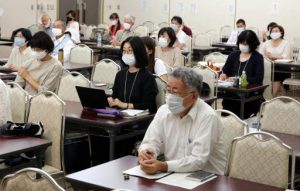Hiroshima City shortens training periods by one year for A-bomb survivors and ‘memory keepers’ who convey A-bomb memories
May 13, 2021
Aim is to expand system for passing on A-bomb memories to reduce burden on A-bomb survivors
by Kana Kobayashi, Staff Writer
Starting in fiscal 2021, the Hiroshima City government will shorten the training periods for A-bomb survivors who testify about their own A-bomb experiences and “A-bomb Legacy Successors,” or ‘memory keepers’ who play the role of communicating to the public the survivors’ experiences and their hopes for peace. The one-year reduction in training means the programs will take place over one year for the survivors who communicate their own experiences, and two years for the A-bombing memory keepers. Reducing the burden on aging survivors in this way might encourage their consideration of taking on the job of communicating their experiences, leading to increased numbers of people who can pass down A-bombing memories.
The training program was initiated in fiscal year 2012. After receiving a commission from the Hiroshima Peace Culture Foundation (in the city’s Naka Ward), which operates the museum, those who have completed the training program share, at the Hiroshima Peace Memorial Museum or at schools that request their services, their own memories of that day or stories ‘inherited’ from A-bomb survivors.
In the training to receive such commissions, the program provides around 10 lectures about the reality of the atomic bombings and the worldwide situation regarding nuclear weapons. Ultimately, the trainees complete a manuscript based on their own A-bomb experiences or the stories they learned from the A-bomb survivors with whom the trainees formed a “mentor-mentee relationship.” The two different categories of trainees then engage in practice sessions to refine their communication styles.
Starting this fiscal year, the time period for creating the manuscript will be shortened for the A-bomb survivors. The memory keepers will begin listening to A-bomb survivors’ testimonies in the first year of the program, work that typically started in the training program’s second year. The period for this part of the program will be reduced to nine months from the conventional one-year timeframe. On the other hand, the city will increase the number of staff handling the program to two from one staff member to enhance efficiency while maintaining the program’s content and quality.
The city government will call for applicants to apply to this year’s program starting in mid-May, with the schedule calling for actual training to begin sometime in July. If the new candidates are able to complete the training as scheduled, the A-bomb survivors and the memory keepers will be commissioned for the first time in April 2022 and April 2023, respectively.
The city government has indicated that 32 A-bomb survivors applied for the training program when it first began in fiscal 2012. However, in fiscal 2020, there were no applicants, a first for the program. The number of A-bomb survivors who continue to share their accounts of the atomic bombing has dwindled over time due to death or health issues. As of April 1, 2021, a total of 35 A-bomb survivors were engaged in the activity.
The 42 applicants for the memory keeper training program in fiscal 2020 marked the lowest number to date. The number of active memory keepers continued to increase ever since its launch in 2015 with 50 at the time, but the number decreased for the first time in fiscal 2021 compared with the previous fiscal year by one person, making the total of memory keepers 149.
The city government’s Peace Promotion Division indicated, “With the aging of A-bomb survivors, we hope to create a system by which we have as many A-bomb survivors and memory keepers as possible cooperate in widely passing on A-bombing memories.”
The city government is also deliberating on decreasing the frequency of participation by active A-bomb survivors in memory-keeper training sessions from three to one session, aiming at easing the burden on the survivors. Instead, staff members from the city and the Peace Culture Foundation will lend a hand at the training sessions in which the survivors themselves do not participate.
(Originally published on May 13, 2021)








